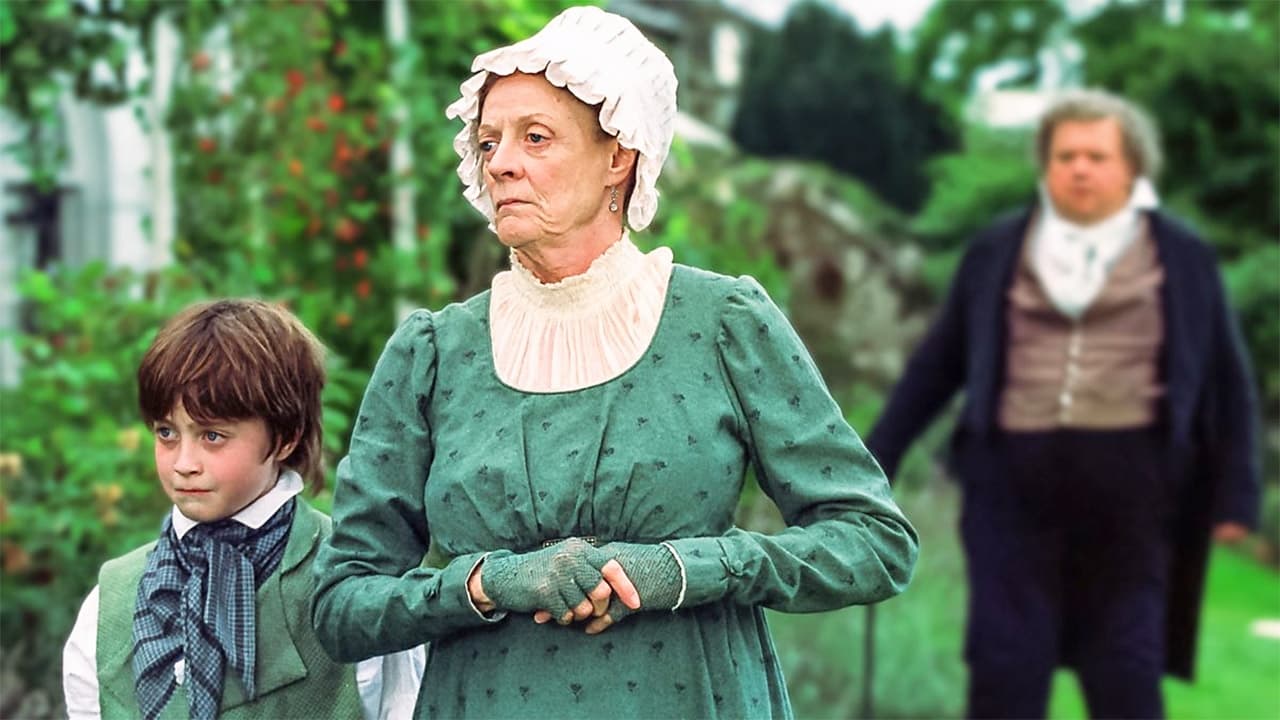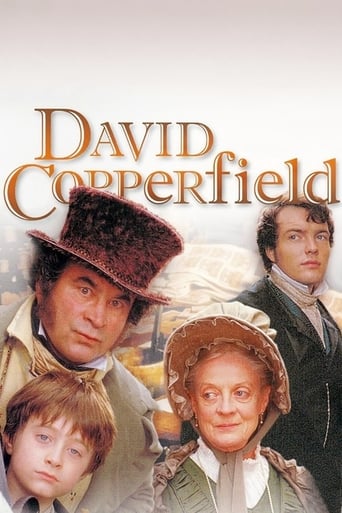



Pretty Good
just watch it!
It’s fine. It's literally the definition of a fine movie. You’ve seen it before, you know every beat and outcome before the characters even do. Only question is how much escapism you’re looking for.
View MoreThere are moments that feel comical, some horrific, and some downright inspiring but the tonal shifts hardly matter as the end results come to a film that's perfect for this time.
View MoreI thoroughly enjoyed this adaptation of Dickens's book, and yes I preferred it over the 2000 version. Is it true to Dickens's work? It is reasonably, though the book isn't particularly easy to adapt at all, then again what Dickens book is? Even if there are any flaws such as it being a tad too long, it is completely compensated by the production values, music and the quality of the acting. The production values are superb, like in Bleak House and Little Dorritt, the sets are realistic-looking, the scenery breathtaking and the costumes sumptuous. The direction is also good, and sticks to the time period and the situations likely to happen during that period. The script is above decent, and does a more than acceptable job in adapting the book, and the music is lovely.And of course the acting is exceptional. I was compelled to write a separate paragraph as there are so many performances I wish to acknowledge. Daniel Radcliffe is simply adorable as young David, and acts being vulnerable very convincingly. I don't know about anybody else but I think this is the best I've seen Daniel act. Maggie Smith was simply born for the role of Aunt Betsy Trotwood, and Trevor Eve is a chilling and vile Mr Murdstone. I also loved Bob Hoskins as the debt ridden but kindly Micawber, Zoe Wannamaker as Jane Murdstone, Pauline Quirke as maternal Pegotty and Amanda Ryan as the alluring Agnes Wickfield. Also worth of mention are Allun Armstrong as Daniel Pegotty, Ian McKellen as the sinister Creakle(a character I found disappointingly forgettable in the 2000 version) and especially Nicolas Lyndhurst as the snake-like and odious Uriah Heep.Overall, I loved this 1999 adaptation for especially the acting. 10/10 Bethany Cox
View MoreThe rave reviews of this version are due more to contemporary audience's total ignorance of Dickens' writing, comfortable familiarity with the actors playing the roles and limited attention span. I saw the 1974 version first, with utterly unfamiliar actors, and a 300 minute length, as opposed to 186 minutes. Massive amounts of plot were excised. The only actor whose performance was worthy of Dicken's intentions was Pauline Quirke as Pegotty. In the 1974 version, Martin Jarvis played Uriah Heep, an icon of unctuous, oily, perfidy and criminality, so much richer than the current one. And Mr. Micawber (I love Bob Hoskins, mind you) but the script gave much greater depth to his pecuniary failures in the 1974 version. And the actor chosen to play Copperfield - what were the producers thinking? Copperfield is an alter-ego of Dickens himself, not some wimpy pretty naive boy. An intellectual, a writer. Everything came out right at the end (as Dickens always arranged)but it was so neatly done and so unsatisfying. If you're a Dickens fan, I enourage you to watch the 1974 version.
View MoreThis BBC version of David Copperfield demonstrates rather well the differences between a novel and a film or TV production. On the face of it, there is nothing wrong with this - in fact as far as TV productions go, this is rather good. High - very high - production values, top-notch actors, good direction: it's all there. So why does it only get half marks. Well, that has to do with the difference between film and writing. We live in a visual age where visual impressions are everything. So for many years now Hollywood has been getting away with producing highly successful, high-grossing film which, at the end of the day, have very little going for them but loads of action. This is true of films ranging from vacuous nonsense such as Enemy Of The State, which is nothing but one long chase to family films such as the equally vacuous Home Alone. The secrecy is to make sure the viewer has no time to think. In fact, thought is a no-no (something which seems to be a feature of our age in the Western world anyway.) Fiction can be equally as exciting, but the writer has none of the resources of the film maker: no film score, no special effects, no computer animation, no soundtrack. Everything - and that does mean everything - has to be conveyed somehow by the written word. And everything takes place in the reader's imagination. And sparking that imagination is the art of the writer. Ironically, despite apparently far more limited resources, the writer is far freer. In a very curious sort of way he has no restrictions whatsoever. So what has this to do with the BBC production of David Copperfield? Well, it is this: through no fault of its own, the 'movie' version of David Copperfield simply isn't very good. Why? Because what can be established in the novel takes far longer to be established on film, or at least in a film using this conventional kind of production. Dickens, despite being restricted to merely a quill pen and a well of ink, could give his story far more depth than a TV production, which is not allowed to take too long doing anything for fear of losing the viewer's interest. Some examples of why this TV production simply leaves too much out in the cold to allow for an enjoyable, intelligent rounded experience: David's nasty stepfather: exactly why does he take a dislike to David and treat him so badly? David's relationship with Peggoty's family in Yarmouth: we are simply informed that he forges a close bond with them, but never shown why. Steerforth's relationship with his mother and his mother's companion: this is all very much drama lite. Steerforth's seduction of Emily: it all happens off-stage and really doesn't register. Betsy Trotwood: just why does she have such a down on boys? Who knows? The list could go on. Everything on screen is presented and intended simply to be accepted. No reasons or justifications are ever given. On the written page, on the other hand, and given the freedom of the writer to employ whatever means he or she wishes to tell his or her story, these things can be established. The writer can digress, explain, range over time and distance, do things which are often impossible for the filmmaker. It is an irony that the writer is far less constricted and restricted in what he might do than the filmmaker, despite all the technical whizzbangs and tricks whichthe the film director has to hand. I pointed out that this particular version of David Copperfield might have suffered from the very conventional television direction. The implication is that given another director, this might have been more convincing. Oh well. For those who like their Sunday afternoon Dickens, this is passable stuff. But in no way does it rise above being very ordinary.
View More1. Charles Dickens is still depressing2. Bob Hoskins was less annoying than expected3. tiny!Daniel is the cutest thing ever invented4. I have a crush on the little red headed girl who lives in the boat5. I want to live in a boat6. That older kid at the school was pretty cute too7. Mrs Copperfield and Peggaty are so Frodo and SamIt's actually pretty good, I enjoyed it quite a lot and as I'd avoided reading the book on account of it being by Charles Dickens I didn't really know what was going to happen.Unfortunately grown up David was terribly unappealing. I think when Daniel Radcliffe grows up they should digitally insert him into the second part so he can play grown up David too. Steerforth was much better looking. Dora was so terribly wet I was most thankful as to her fate (shame the dog didn't share it), Emily was much better than Dora.
View More